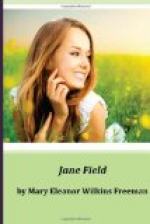The three women stared at her, then at each other. Their faces were white. Amanda was catching her breath in faint gasps. Jane Field rushed out of the room. The door closed heavily after her.
Three wild, pale faces huddled together in a window watched her out of the yard. Mrs. Babcock called weakly after her to come back, but she kept on. She went out of the yard and down the street. At the first house she stopped, went up to the door and rang the bell. When a woman answered her ring, she looked at her and said, “I ain’t Esther Maxwell!” Then she turned and went down the walk between the rows of marigolds and asters, and the woman stood staring after her for a minute, then ran in, and the windows filled with wondering faces.
Jane Field stopped at the next house with the same message. After she left a woman pelted across the yard in a panic to compare notes with her neighbors. She kept on down the street, and she stopped at every door and said, “I ain’t Esther Maxwell.”
Now and then somebody tried to delay her to question her and obtain an explanation, but she broke away. There was about her a terrible mental impetus which intimidated. People stood instinctively out of her way, as before some rushing force which might overwhelm them.
Daniel Tuxbury followed her out to the street; then he fell back. Mrs. Jane Maxwell caught hold of her dress, but she let go, and leaned trembling over her iron gate looking after the relentless black figure speeding to the next door.
She went on and on, all the summer afternoon, and canvassed the little village with her remorse and confession of crime. Finally the four words which she said at the doors seemed almost involuntary. They became her one natural note, the expression of her whole life. It was as if she had never said any others. At last, going along the street, she repeated them to everybody she met. Some she had told before, but she did not know it. She said them to a little girl in a white frock, with her hair freshly curled, carrying a doll, and she ran away crying with fright. She said them to three barefooted boys loping along in the dust, with berry-pails, and they laughed and turned around and mocked her, calling the words after her. When she went up the path to the Maxwell house, she said them where the shadow of a pine-tree fell darkly in front of her like the shadow of a man. She said them when she stood before the door of the house whose hospitality she had usurped. There was a little crowd at her heels, but she did not notice them until she was entering the door. Then she said the words over to them: “I ain’t Esther Maxwell.”




